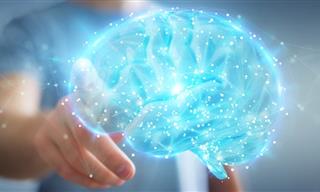Much is still being discovered about mental health problems like depression, bipolar disorder, chronic stress, anxiety, and post-traumatic stress disorder (PTSD, also known as shell-shock). New tests conducted on mice have revealed a protein produced by the brain that can help regulate the production of important neurotransmitters, including the ones linked to stress responses. This discovery has the potential to drastically raise the effectiveness of treatments for all stress-related mental health disorders.
Developed Instincts

(By Jim Linwood, Wikimedia Commons)
Since the earliest days of mankind, our brains and bodies began to develop our instincts, the tools we would need to survive every threat that came our way, from apex predators to long bouts of starvation or dehydration. Our brains release hormones, like adrenaline, norepinephrine, and steroids like cortisol which activate our fight-or-flight response when faced with danger or stressful situations. Other hormones released by the brain include serotonin and dopamine, which are linked to feelings of happiness, enjoyment, and euphoria.
These chemicals allow our mind and body to function efficiently and respond to various stimuli, like relaxing your body after drinking a hot cup of coffee, or immediately withdrawing your hand when you accidentally touch something hot. They are vital to our physiology and overall functionality.
How Does It Lead to Stress?
The levels of the hormones, the volume at which they are produced, and even the speed at which they incite physical responses can vary from person to person. Low levels of serotonin have been linked to depression and high levels of dopamine have been known to trigger addictions.
Excessive production of fight-or-flight hormones can lead to increased heart rates, hyperventilation, panic attacks, and emotional breakdowns. Prolonged or frequent anxiety attacks like this can lead to chronic stress. Coupled with traumatic experiences like incidents of assault or encounters during military combat, post-traumatic stress disorder is extremely likely to develop. Surveys have shown that nearly 15-20 veterans out of every 100 are suffering from PTSD.

Chronic stress can result in severe mental and physical symptoms, from memory problems and delayed cognitive function to developing skin conditions, rapid weight gain or loss, a damaged or weakened reproductive system, and even heart disease. These symptoms are shared with PTSD, which also comes with nightmares and sleep disorders, severe mood swings, social isolation, and emotional outbursts.
Currently, most treatments for stress-related disorders include counseling, lifestyle changes, and the use of stress-management techniques, all of which can be immensely helpful but may be less than effective in more severe cases.
The Role of This Study

(Wikimedia Commons)
The test in question was conducted by researchers from Stockholm's Karolinska Institutet in collaboration with VU University in Amsterdam, who wanted to look into the role of a naturally occurring protein, p11, in reducing or mitigating stress responses.
This line of research came on the heels of a previous study which conclusively determined that p11 plays a role in enhancing serotonin levels. It was found that people suffering from depression and battling suicidal tendencies (or had committed the act) had unusually low levels of p11. These results were also determined to be the same in mice, and that antidepressants commonly prescribed to people do result in an increase of this protein.
Keeping that in mind and noting the close relationship between depression and signs of anxiety, the researchers wanted to determine if this protein could alter the body and brain's response to stressful conditions and trauma.
Conducting the Tests
For the purposes of this scientific investigation, "knockout" mice were bred, specifically mice that lacked the gene required to create p11. Their behavior was compared to that of mice without that particular defect in a series of stress-inducing tests. One test involved separating the two groups of mice pups from their mother for a number of hours, which resulted in the p11-deficient pups producing more distress calls at a higher pitch.
Another test, this one conducted on adult mice, gave the animals a choice between spending time in a dark or a brightly lit space. The mice low on p11 opted to spend less time in brightly lit spaces. Overall, the results showed that the p11-deficient mice took longer to reduce their heart rates to normal levels after being faced with stressful stimuli.

(Flickr)
The study found that the protein regulates brain activity in two major stress-signaling pathways, the one that produces cortisol, called the HPA (hypothalamus-pituitary-adrenocortical) axis, and the other that releases adrenaline and norepinephrine, called the SAM (sympathetic-adrenal-medullary) axis.
The mice that had low levels of p11 displayed hyperactivity in these pathways for stress responses, which triggers a rapid heart rate, increased blood sugar levels, and suppresses functions considered non-vital when in fight-or-flight mode, all responses to stress that can have devastating effects over long periods.
A Crucial First Step

All research in the impact of proteins like p11 and other chemicals that affect disorders like depression, anxiety, and stress has been only conducted with animal models. This makes it difficult to determine at such an early stage how the protein functions in human models, given the complexities of everyday life and the variety of factors that can trigger stress responses in people. However, it still provides a much needed and vital breakthrough in the field of mental health treatments.
These findings could be the foundation for the development of more effective treatments for mood and stress-related disorders, especially for people suffering from chronic stress. The senior author for the study, Per Svenningsson, says that there could be two possible approaches to using these findings medically.
The first involves enhancing the production of the p11 protein itself which then acts as an efficient regulatory agent for stress responses. The second is a more unique and targeted approach, which would use the make-up and structure of the p11 protein to develop drugs that directly regulate stress levels by blocking the stress responses in the brain.
Though this research has a long way to go before it can be converted into an easily used and widely available medicine, it shows immense promise for the future of mental health treatments and stress-related issues.
Share this scientific breakthrough with others!
 Go to BabaMail
Go to BabaMail


























































